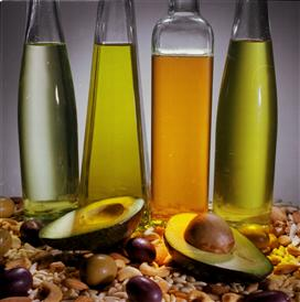The Good News About Bad Fats
Nutrition labels always list total fat content in a product and break down how much saturated and trans fat are found in a serving. These two fats are unhealthy and can clog arteries, leading to heart disease and high cholesterol. Specifically, trans fat can increase your "bad" cholesterol (your doctor calls this LDL, short for "low-density lipoprotein") and decrease your "good" cholesterol (HDL, "high-density lipoprotein"), which can lead to stroke and coronary artery disease (limiting the blood supply to your heart). In the United States, if there is less than .5 g of trans fat in a serving, it can be listed as 0g on a nutrition label. Therefore, it is important to look for trans fats in the ingredients section, typically listed as partially hydrogenated oils. Scientifically, trans fat is derived by adding a hydrogen to oil. This process allows food to last longer. Examples of foods that contain trans fat are cookies, cakes, pies, crackers, French fries and margarine. The American Heart Association recommends limiting trans fat intake to less than 2 grams per day.
Saturated fat also affects your cholesterol levels by increasing your "bad" cholesterol levels (LDL), increasing your risk for heart disease. The only good news is that saturated fat is listed on the nutrition label, making it easier to identify foods that you may want to limit from your diet. Similar to trans fats, saturated fats are found in junk foods, cookies, cheesecake, and fast foods, like French fries and hamburgers. They are also primarily seen in animal products, like bacon and steak. To avoid saturated fats, it is important to limit your red meat intake, and aim for leaner cuts of protein such as chicken or fish, and increase fruit and vegetable intake.
 The good fats are the unsaturated fats, poly- and mono-. These fats are actually good for your heart and may help lower cholesterol. Both fats are not listed on the nutrition facts label. Therefore, to determine the total amount of "good" fats (polyunsaturated and monounsaturated) in a food, subtract saturated and trans fat from total fat. Monosaturated fats, in addition to improving cholesterol levels, may help with diabetes by helping control glucose levels and insulin. Polyunsaturated fat may also reduce the risk of heart disease because it contains omega-3 and omega-6 fatty acids. Omega-3 fatty acids, typically found in fish, have been shown to reduce coronary artery disease, help lower blood pressure levels, and decrease your "bad" cholesterol (LDL). In addition, it promotes brain and proper cell functions.
The good fats are the unsaturated fats, poly- and mono-. These fats are actually good for your heart and may help lower cholesterol. Both fats are not listed on the nutrition facts label. Therefore, to determine the total amount of "good" fats (polyunsaturated and monounsaturated) in a food, subtract saturated and trans fat from total fat. Monosaturated fats, in addition to improving cholesterol levels, may help with diabetes by helping control glucose levels and insulin. Polyunsaturated fat may also reduce the risk of heart disease because it contains omega-3 and omega-6 fatty acids. Omega-3 fatty acids, typically found in fish, have been shown to reduce coronary artery disease, help lower blood pressure levels, and decrease your "bad" cholesterol (LDL). In addition, it promotes brain and proper cell functions. The body is unable to make omega-3 or omega-6 fats, so it is important to look for foods that contain these fats. Examples include fatty fish (i.e. salmon), nuts and seeds. Unsaturated fats can also be found in olive, canola, and soybean oils, avocados, and peanut butter. All oils should be used to sauté, marinate, or pan fry. Try to avoid deep frying. Solid fats tend to have saturated fats, while liquids (such as oil) have more unsaturated fats.
In summary, while all fats should be limited, a higher amount of polyunsaturated and monounsaturated fats may be beneficial to your heart and cholesterol levels. Keep in mind that all fats have 9 calories per gram, so foods with fats are higher in calories and should be counted if you are watching your weight. When choosing fats, aim for heart healthy ones: polyunsaturated and monounsaturated, and limit your saturated and trans fat intake.
Rhea Li is a Registered Dietitian who received her Bachelor's degree in Nutrition and Master's degree in Public Health from the University of Texas. She has a special interest in working with children and has received her certification in pediatric weight management. Currently, she is working on a research study to determine the importance of nutrition in pediatric cancer patients. In the past, she has worked with pregnant women and their children. In her spare time, she enjoys being with family, exercising, traveling and of course, eating. To contact Rhea, please visit dazzlingdietitian.blogspot.com or her Twitter account, Rhea_Li.
-
Weight Loss On Your New Years Agenda Prepare For The Top Weight Loss Scams Of 2006 PART 1
Ill admit, scam may be too harsh of a word for what Im about to relay
-
Top Thirty Weight Loss Tips And Tricks
Here are some everyday, helpful hints to get you started, keep you goi
-
What Everybody Ought To Know About Diet Suppresant?
Diet suppressant that has no side effects and eliminates fats in th
-
Detox Diet: the Key to a Healthy Lifestyle
Detox, short for detoxification, is the body’s natural, ongoing
-
Want To Loose With All Avoidance - Join Biggest Losers Club
All or nothing thinking -- that you have
-
The South Beach Diet Summarized
What is the South Beach Diet all about? The diet was created by Dr.
- DON'T MISS
- Diet Mistakes That can Ruin your Efforts to Lose Weight
- Prescription Weight Loss Pills: A General Guide
- 5 Fats That Dont Make You Fat
- Emotional Eating - Battle For Your Future and Take It Slowly
- Is Your Carb Addiction Making You Fat? Here's the Cure
- Most Googled Diets Of 2015
- What diet plan is undoubtedly most beneficial for you ?
- Nutrisystem Diet, Does It Work? And Other Weight Loss Tips!
- Fighting Stress and Losing Weight With Cortislim Weight Loss Product?
- Consumer Health Awareness Proves How Easy it is to Eat Healthy




